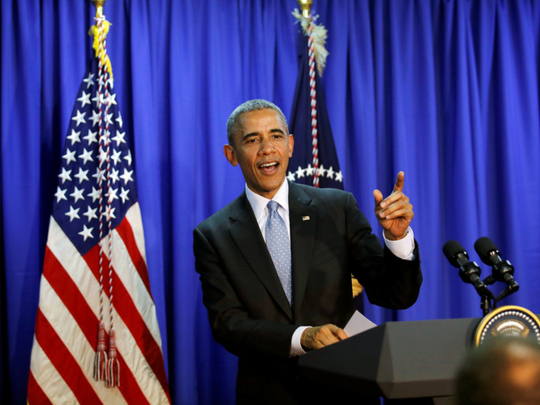
Wise men say that an apology stems from a wisdom that far surpasses power. Had it not been for apologies, people would have been led by arrogance. This is a travesty, because there are some who perceive an apology as a sign of weakness.
The question that poses itself here is: Will we witness new and brave instances of apologies this year?
Early signs seem to indicate that. However, optimism regarding such expectations can sometimes be disheartening if they do not come into being, particularly for those who are betting on the world’s social and civil development.
Apologising is a compassionate and civilised act that can only be carried out by the brave. This applies to both individuals and nations. United States President Barack Obama was awarded the Nobel Peace Prize in January 2009, during the first few months of his presidential term, because of his quest for a world free of nuclear weapons. Obama is in Japan this week and his agenda includes a trip to Hiroshima today, the city that the US dropped a nuclear bomb on, along with Nagasaki, in August, 1945, resulting in the deaths of 135,000 people.
During the trip, will Obama talk about a world that is free of nuclear weapons? Alternatively, will he dodge the topic altogether with his rhetoric? Already, those opposing his visit to Hiroshima have warned him not to do so and instead have said that Japan should be apologising first for killing thousands of US soldiers in its prisoners of war (POW) camps.
Americans think that dropping the nuclear bombs was a “positive” move because it ended the Second World War and resulted in Japan surrendering. The Japanese narrative, meanwhile, is different. They condemned and denounced the act as a violation in rules of engagement regarding which weapons can and cannot be used.
However, it seems that Obama will not be waiting for an apology that will never come from the Japanese, merely because the Japanese believe that they have suffered more than the Americans from the aforementioned incidents. To this very day, there are people who are being treated in hospitals because they are suffering from the nuclear bomb’s radiation.
Another indication that Japan will not be apologising can be gleaned from their stance on the American film Unbroken, directed by Angelina Jolie. Japan refused to release the film in Japanese cinemas. The film revolves around American prisoners in Japanese POW camps. It also depicts how American prisoners challenged their jailers and did not break down when they were tortured, according to the American novel that the film is based on.
Apologising is a matter of being civilised and from the perspective of civilised societies, it is a sign of hope that the world will come back to its senses and will spread love and peace instead of wars and man-made crises. A number of nations were able to apologise and as a result became more civilised and respected in the world’s eyes. In 2008, Australia apologised to its indigenous people — a small step towards correcting mistakes of the past. Speaking on that occasion, Australia’s former prime minister Kevin Rudd, said: “We apologise for the laws and policies of successive parliaments and governments that have inflicted profound grief, suffering and loss on these our fellow Australians. We apologise especially for the removal of Aboriginal and Torres Strait Islander children from their families, their communities and their country.”
In the same year, Canada also apologised to its indigenous people, with its former prime minister Stephen Harper issuing the apology in the House of Commons.
The world today awaits new, bold and overdue apologies so the world’s conscience can be at ease and so that the party issuing the apology can feel a sense of purification, not atonement. Some apologies do not resolve the issue at grass-roots levels, and those awaited apologies must be audible and clear in a way that lives up to the status of the people who are being apologised to.
Among these apologies is one that must be issued by the British to the Palestinians for the Balfour Declaration, which “granted” Palestine as a permanent state to Israelis. Palestine remains the only occupied country in the 21st century.
The second is an apology by France to the Algerians because of the actions they committed against them when they occupied Algeria. The third is an apology from Italy to the Libyans, for the same reason regarding the French occupation of Algeria. Another long-awaited apology is one that should be coming from Iran for its actions in Syria, Iraq and Yemen. All indications prove that it has assisted foreign powers in undermining the stability of these countries and spreading chaos.
The world will be a more beautiful place if it knows the value and meaning of an apology.
Mohammad Hassan Al Harbi is a renowned columnist and author whose writings cover various fields ranging from media studies to education. He has worked in various UAE media outlets as well as the banking sector. He holds a Master’s degree in Media and Journalism.









